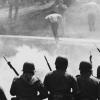Leadership Is Needed Against Our Invisible Enemy
Street Scribe

Photo Credit: Eric Frommer
Singer-songwriter John Prine was among the most prominent victims claimed by COVID-19.
"April is the cruelest month," wrote T.S. Eliot in 1922. The poet's words from almost a century ago apply today to America and to the world as the coronavirus pandemic marches across this nation and around this planet like some implacable, invisible army.
As this column is being written on the morning of Apr. 8, there have been more than 83,000 deaths from the virus around the world, and nearly 13,000 deaths from the disease here in the United States. This morning's news announced the coronavirus death of Grammy Award-winning musician John Prine, the internationally known singer-songwriter who delighted Athens audiences when he performed in our city in years past. The coronavirus has been a true grim reaper, killing the famous, like Prine, along with thousands of unknown, unsung but not unloved people. Already in America, the death toll from the illness is more than four times that of the infamous 9/11 terrorist attacks in 2011, which killed nearly 3,000 people—and the carnage continues.
Americans grew up with movies and science fiction stories that fed fears of a quick and fiery end to civilization caused by nuclear war or a bolt from the blue in the form of a comet or an asteroid impacting Planet Earth. Pandemics like coronavirus offer no such sudden end to civilization, but we are discovering anew the deadly damage that a tiny virus—smaller than a dust mite, invisible except through the eyes of powerful microscopes—can inflict on lives and finances alike.
Ronald Reagan, the secular saint of the Republican Party, famously claimed that government is the problem and not the solution. The present pandemic should show that government action is needed on the local, state and federal levels to combat this invisible enemy that threatens all of us. The pandemic has felled citizens across class and racial lines in today's America, but, as is usual during any sort of disease or depression, it is the poor and racial minorities who suffer the most. Even if governments do their best to fight the virus, individual actions and precautions by citizens are imperative if this deadly disease is to be contained. Face masks have made a needed comeback in the America of 2020—a grim fashion echo of citizens in 1918 who helped fight Spanish flu by adding face masks to their wardrobes when going out in public.
Americans are a friendly, handshaking, back-slapping people who are not used to the "social distancing" called for to combat coronavirus. In America BC—before coronavirus—millions enjoyed concerts, plays, movies, sporting events, restaurants, shopping malls, barrooms and church services every day and every night in every state in "the land of the free." Today, America is on hold, and millions are staying confined to their homes during this time of "patiopocalypse." We are air-conditioned and app-connected during this time of trouble, but we are unable to enjoy the simple human pleasures of hugs, handshakes, family meals and face-to-face conversations. This country and this world can overcome this latest threat, but it will not be easy, and it will require action and sacrifice by political leaders and ordinary citizens.
A war is being waged against a deadly foe. Heroes are emerging every day from that war, and citizens owe a debt of gratitude to the doctors, nurses, emergency medical technicians, respiratory therapists, police officers, firefighters, food servers, journalists, sanitation workers, druggists, grocery store personnel and others who strive to provide for the needs of all during this time of trial and tribulation. While millions are housebound during this pandemic that raises fears of an armchair Armageddon, we must wash our hands and cross our fingers for national leadership on par with that of President Franklin Roosevelt, who back in 1944 proposed the right to adequate medical care for all Americans, as well as the right to protection from financial burdens caused by aging, illness, accident or unemployment. Roosevelt's compassion and action during the Great Depression and World War II are needed more than ever from the president today. Humorist and political observer Will Rogers was correct during Depression times when he said wise words that apply today: "In time of crisis, people want to know that you care, more than they care what you know."
Keywords
More by Ed Tant
-

Study Shows Pandemics Can Give Rise to Fascism
Street Scribe
-

Six Plague Page-Turners to Read During the Pandemic
Street Scribe
-










comments